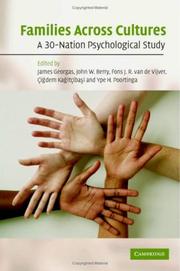| Listing 1 - 1 of 1 |
Sort by
|

ISBN: 9780521822978 0521822971 9780521529877 0521529875 9780511489822 1107159741 1280567821 0511241542 0511240503 0511318170 051148982X 051124102X 9780511242106 0511242107 9780511241543 051123953X 9780511239533 9780511240508 9780511241024 9781280567827 9786610567829 6610567824 Year: 2006 Publisher: Cambridge Cambridge University Press
Abstract | Keywords | Export | Availability | Bookmark
 Loading...
Loading...Choose an application
- Reference Manager
- EndNote
- RefWorks (Direct export to RefWorks)
Contemporary trends such as increased one-parent families, high divorce rates, second marriages and homosexual partnerships have all contributed to variations in the traditional family structure. But to what degree has the function of the family changed and how have these changes affected family roles in cultures throughout the world? This book attempts to answer these questions through a psychological study of families in thirty nations, carefully selected to present a diverse cultural mix. The study utilises both cross-cultural and indigenous perspectives to analyse variables including family networks, family roles, emotional bonds, personality traits, self-construal, and 'family portraits' in which the authors address common core themes of the family as they apply to their native countries. From the introductory history of the study of the family to the concluding indigenous psychological analysis of the family, this book is a source for students and researchers in psychology, sociology and anthropology.
Family --- -316.356.2 --- Families --- Family life --- Family relationships --- Family structure --- Relationships, Family --- Structure, Family --- Social institutions --- Birth order --- Domestic relations --- Home --- Households --- Kinship --- Marriage --- Matriarchy --- Parenthood --- Patriarchy --- Psychological aspects --- Gezinssociologie --- Social aspects --- Social conditions --- 316.356.2 Gezinssociologie --- Ethnopsychology --- 316.356.2 --- Cross-cultural psychology --- Ethnic groups --- Ethnic psychology --- Folk-psychology --- Indigenous peoples --- National psychology --- Psychological anthropology --- Psychology, Cross-cultural --- Psychology, Ethnic --- Psychology, National --- Psychology, Racial --- Race psychology --- Psychology --- National characteristics --- Ethnopsychology. --- Health Sciences --- Psychiatry & Psychology
| Listing 1 - 1 of 1 |
Sort by
|

 Search
Search Feedback
Feedback About UniCat
About UniCat  Help
Help News
News